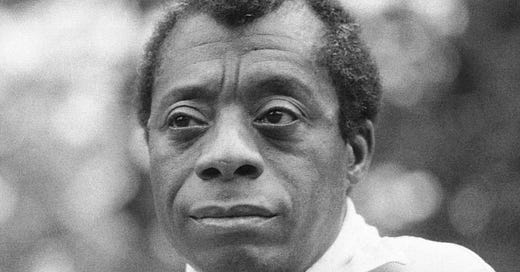Happy Friday, everyone.
Just a brief note this week. Apropos of nothing, I wanted to share my favorite quote, from James Baldwin:
“Any real change implies the breakup of the world as one has always known it, the loss of all that gave one an identity, the end of safety. And at such a moment, unable to see and not daring to imagine what the future will now bring forth, one clings to what one knew, or dreamed that one possessed. Yet, it is only when a man is able, without bitterness or self-pity, to surrender a dream he has long cherished or a privilege he has long possessed that he is set free—he has set himself free—for higher dreams, for greater privileges. All men have gone through this, go through it, each according to his degree, throughout their lives. It is one of the irreducible facts of life.”
It’s from an essay Baldwin wrote in 1956, in response to William Faulkner’s arguments that we should slow down Civil Rights reform in the South, to give Southerners time and space to change their minds more gradually. Baldwin argues against this forcefully, starting with his opening line, which is the quote above. (You can read his essay here to see how it plays out.)
Baldwin is writing in the 1950s about racism in the US, but he rightly identifies that it is perennial issues of moral psychology that are fundamentally at play.
Change is hard. It is particularly hard to recognize that one is wrong or deficient in some way, a way that is important. In these cases, it feels like one has to fight against one’s self-conception and self-esteem—there’s no way to change and be the same person, and worse, to recognize that one has been a bad person in some way. Incompetent, inconsiderate, perhaps even morally bad.
But actually, if you push through, you’ll find your self-conception and self-esteem elevated. There’s a way that you change, but it’s a liberating sort of change. And it’s better for one’s self-esteem to have been wrong than to keep up a pretense that one has always been right. Fundamentally, one’s self-conception and self-esteem can flow from the deeper power to identify and effect such change. There’s a capacity we have for honesty and agency that runs deeper than any possible self-doubt, and that capacity is at the core of who we are.
I’ve come back to this quote many times in my life, when struggling in a relationship, or with work, or just with making sense of the human condition. It’s also helpful to keep in mind for the struggles of others. When someone else is on the wrong path, what they need is to grapple with that fact, which takes courage and, if it happens, deserves great praise.
The quote is very relevant to what we want our students to achieve. We want to nurture in them this sort of inner courage. And it’s also relevant to each of us, in our role as educators. Interestingly, Montessori describes many commonplace attitudes towards education and children to be “prejudices”, and treats overcoming and correcting them similarly as issues of an educators’ or a parents’ self-liberation. The great work of education demands change of us, as well.
Have a great weekend,
Matt Bateman
Executive Director, Montessorium
Subscribe to Higher Ground's Friday Notes
Broadcasting the weekly internal memos of Higher Ground Education









Hey Matt!
It seems the messaging in Friday Notes always come just as they are needed. We have just completed our annual performance reviews. Along with highlights of some wonderful things I’ve worked on, I was also challenged in areas that, at first thought, I did not feel we’re areas of growth for me. My initial reaction was one of stubbornness, selfishness, and pride. Why should I make changes in this area? It’s working for me. But, what is working for me may not be working for others. In fact, it may not be really working for me either. One thing I love about our community is the push to grow beyond our current state and reach down to realize that we each have more potential. It is easy for me to see that in my work with the children and even when I work to support other Guides. But it becomes a challenge when I think about pushing myself. Change is hard, but necessary for growth and deeper understanding of the people and world around us as well as a deeper understanding of ourselves.